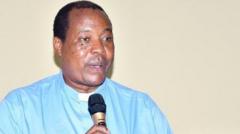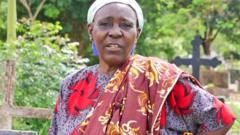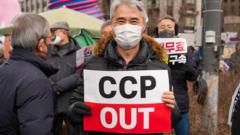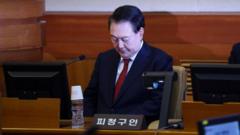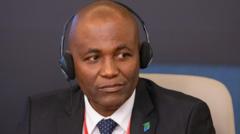**The disqualification raises concerns over the fairness of Tanzania's electoral process as the ruling party aims to solidify its grip on power.**
**Tanzanian Opposition Party Disqualified from Upcoming Elections Amidst Turmoil**

**Tanzanian Opposition Party Disqualified from Upcoming Elections Amidst Turmoil**
**Chadema’s exclusion from the elections follows the arrest of its leader Tundu Lissu on treason charges.**
Tanzania has reached a critical juncture as its primary opposition party, Chadema, has been effectively barred from participating in the upcoming elections. The ban comes in the wake of the party's leader, Tundu Lissu, facing grave treason charges following remarks made during a recent rally advocating for electoral reforms. Ramadhani Kailima, the director of elections at the Independent National Elections Commission, announced that Chadema was disqualified because it failed to sign a necessary code of conduct document by the specified deadline.
Lissu's arrest last week has drawn attention as he was anticipated to pose a significant challenge to incumbent President Samia Suluhu Hassan in the forthcoming parliamentary and presidential elections. The ruling party, Chama Cha Mapinduzi (CCM), has dominated Tanzania's political landscape for 46 years, benefiting from the disqualification of a major competition. Kailima added that not only would Chadema be unable to contest the general election, but they would also be barred from future by-elections until 2030.
Chadema had previously asserted its intention to abstain from the code of conduct signing ceremony, aligning with their call for substantial voting reforms. Observers note that since Hassan assumed office after President John Magufuli's death in 2021, a litany of accusations have been leveled against her government for escalated crackdowns on dissent and political opposition.
Lissu, known for his vigorous advocacy for electoral reforms under the theme "No Reforms, No Election," argues that the electoral commission's structure must undergo substantial changes. Facilitated by appointees closely tied to Hassan, the current setup is under scrutiny as opposition figures continue to allege politically-motivated accusations in Lissu's case. His lawyer contends that the treason charges are a political maneuver designed to suppress dissent. Notably, Lissu has faced numerous legal challenges and survived an attempted assassination in 2017, events that have escalated his accusations of a dangerous political environment in Tanzania.
As the date for the elections approaches, tensions are likely to mount, casting a shadow over the credibility of Tanzania's democratic processes and prompting concerns about the future of political freedom in the nation.

